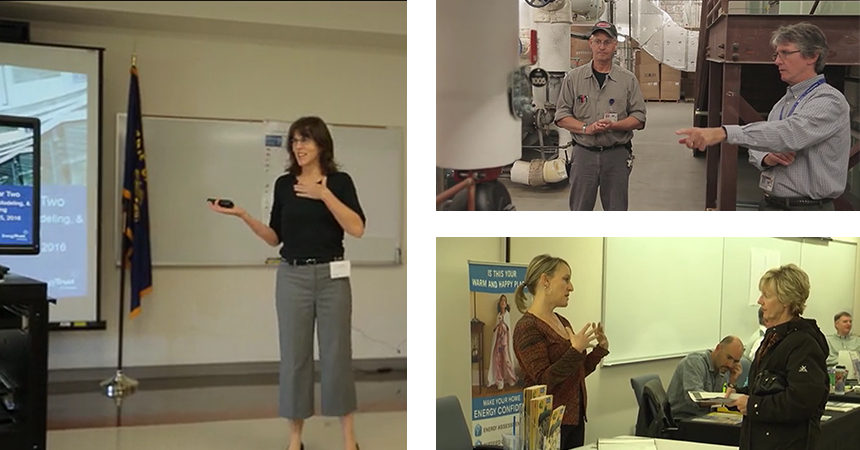
As a business, you want your customers and community to know that you care about their welfare. This goes deeper than providing high-quality products or services. You want to use less energy and protect the environment—to show your audience that your values align with the choices you make.
Energy Trust helps businesses build sustainable energy practices to deliver long-term savings through Strategic Energy Management (SEM). SEM goes beyond investments in facility upgrades by focusing on setting goals, tracking progress, reporting results and engaging staff in energy-saving practices.
North Clackamas School District
SEM participants are paired with an energy coach and a cohort of business peers they engage with in their training. “Energy Trust provides the support we need to succeed,” says Melinda Shumaker, facilities director at North Clackamas School District. “Our energy coach provides the technical knowledge and walks us through the process. And when we go to cohort meetings, we have something to show for our work. We celebrate everyone’s accomplishments and successes.”
North Clackamas School District enrolled in SEM in October 2015 and recently re-enrolled for a second year. With 28 school buildings, administrators knew that saving energy would help reduce operating costs and free up funds for supplies like textbooks and computers. Amanda Wall, custodial coordinator for the district, heads up the new energy team along with Melinda. “We knew we wanted to build a sustainability program at our schools we just needed help to get it started.” –Amanda Wall, custodial coordinator.
Melinda and Amanda together have attended all of the SEM workshops and apply lessons learned from their peers in their own practices. For example, when they earned Energy Trust incentives for electric savings gained through SEM improvements, another cohort member suggested how they might distribute the earnings. “We gave a portion back to the schools,” says Melinda, “and then, as an incentive, the remainder would be available to schools that participated in further energy management activities.”
“It’s one of several ways we’re working to keep energy savings and sustainability on everyone’s mind. And it’s working.”–Amanda Wall, custodial coordinator
SEM helps businesses establish sustainability programs that can reduce operating costs, freeing up funds that can be invested back into the business in other ways.
Columbia Sportswear
Columbia Sportswear has participated in SEM since early 2016. Bruce Freeman, strategic sourcing manager at the company, says working in a cohort has helped him learn how to educate stakeholders. “Our cohort has shown us ways to motivate other division leaders to work together on our energy-efficiency goals.” –Bruce Freeman, strategic sourcing manager
Lowering energy usage aligns with Columbia Sportswear’s commitment to protecting the environment.
“We’re all motivated to save electricity and lower our carbon footprint. SEM has taught us a great deal. It’s helped us to live up to our mission and reputation.”–Bruce Freeman, strategic sourcing manager
SEM enables businesses to build a framework for energy reduction goals and occupant and stakeholder engagement strategies to increase awareness about energy use.
Multnomah County
Energy Trust helps organizations promote the importance of their energy policy and how it aligns with strategic energy-saving goals. Eric Winn, the energy specialist for Multnomah County, says that SEM helped him gain stakeholder buy-in. “As an energy strategist and someone who works in facilities, you will need support and signoff from organizational leaders to achieve your goals. The energy policy does that work for you. Having that framework is helpful.” –Eric Winn, energy specialist.
Multnomah County has been enrolled in SEM since 2013, shortly after Eric started in his position as energy specialist. Winn says participating helped him learn the theories behind energy management and increase efficiency at county facilities. “There’s a cost component to saving energy,” he said. “We have so much space and so many buildings. Efficiently managing our utility accounts and energy consumption can save the county enough money to fund my position and contribute to future projects.”
The county also has a responsibility to represent the community’s values by conserving energy and water and protecting natural resources. Winn encourages businesses with similar goals to check out SEM.
“If you or your organization wants to be conscious of your environmental impact, energy usage and costs, or sustainability in general, you should join.” –Eric Winn, energy specialist.
SEM helps organizations achieve and demonstrate energy savings that align with their mission and values.
Oregon Zoo
Lydia Neill, preventative maintenance manager in the Oregon Zoo’s facilities department, formed a team comprised of representatives from various departments to help develop an energy policy. Neill invited Energy Trust coaches to a meeting to help workshop the policy.
“If facilities is going to ask zoo leadership to make operational changes, they should know how those changes fit into the zoo’s mission, why they’re important and how it could help improve energy efficiency. We want them to help create our energy policy and believe in it.”–Lydia Neill, preventative maintenance manager
SEM helps businesses develop and implement an energy policy that engages employees throughout the organization.
Ready to get started? Contact us to hear about upcoming cohorts, which form regularly. A new Portland cohort will kick off in October 2017, and another in Northeast Oregon is scheduled to begin work in January 2018.
To learn more about Strategic Energy Management, download the Commercial Strategic Energy Management Guide, visit our recently updated web page at energytrust.org/commercialsem, call 1.866.605.1676 or email energymanagement@energytrust.org.
